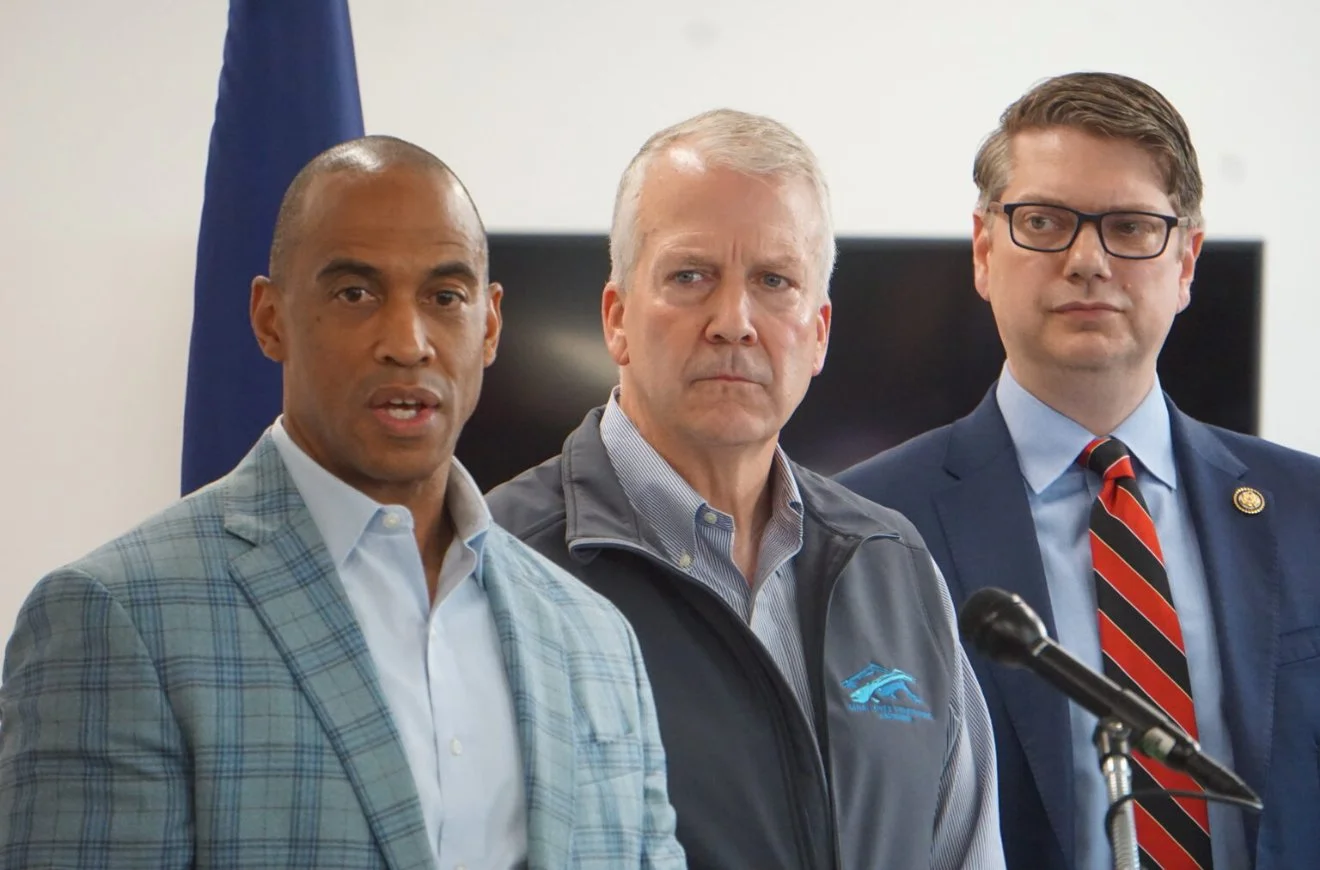US housing secretary visits Alaska to gather insights into urban and rural challenges
Scott Turner, secretary of the U.S. Department of Housing and Urban Development, speaks at a news conference on Tuesday in Anchorage. With him is U.S. Sen. Dan Sullivan, R-Alaska, and U.S. Rep. Nick Begich, R-Alaska. Turner is one of several Trump administration cabinet members who have traveled to Alaska this summer. (Photo by Yereth Rosen/Alaska Beacon)
By Yereth Rosen
The secretary of the U.S. Department of Housing and Urban Development, visiting Alaska this week, said he hopes to learn about challenges facing both the state’s urban centers and remote rural communities.
“I came here to be a great listener, to understand the needs of the people of Alaska, to understand the challenges of the people of Alaska and particularly when it comes to homelessness and affordable housing,” Scott Turner, the Trump administration’s HUD secretary, said at a news conference Tuesday in Anchorage.
Turner is among several Trump administration cabinet members touring Alaska this summer.
He spent part of Tuesday meeting with Anchorage municipal officials who discussed the challenges of homelessness in the state’s largest city.
It is a national issue, Turner said.
That 770,000 people identified as homeless in the nation “is unacceptable to me, it’s unacceptable to my colleagues and I know it’s unacceptable to you,” he said.
In Alaska, he said, almost 2,700 people are homeless, with about 1,700 of them in Anchorage. “That’s something that we want to attack and eradicate,” he said.
Those numbers show that past efforts by HUD to address homelessness have not been effective, said Turner. To make his point, he referred to his background as a professional football player.
“One of the things that holds you accountable in the NFL is called game film,” he said. “You can say what you want to on Sunday during the game. You can say, ‘Well, I did the right thing,’ but on Monday, the film will tell the story, and the film does not lie.”
On Wednesday, Turner was touring Bethel, in Western Alaska, to learn about rural Alaska housing problems.
Crowding is a dire concern in rural communities, according to the Alaska Housing Finance Corp., a state agency. Conditions are most severe in the Yukon-Kuskokwim Delta region, where Bethel is located, according to AHFC. Crowded conditions are linked to poor health, including transmission of respiratory diseases like COVID-19.
Turner said HUD wants to add 7 million more units of affordable housing to the national supply and is focused on reducing regulations that reduce housing access in rural areas as well as in urban areas.
Sen. Dan Sullivan, R-Alaska, accompanied Turner and asserted at the news conference that overregulation by HUD is one of the major impediments to housing availability and quality in rural parts of the state.
“You can send all the money you want to rural Alaska, but it’s so smothered in red tape that it costs a million bucks to build a duplex. One duplex. A lot of that, I think, is self-inflicted,” Sullivan said.
Other analysis identified different problems for rural Alaska housing.
The high cost of energy in rural communities, which are unconnected to larger power grids, is one problem that for years has been cited as a key factor making rural Alaska housing unaffordable.
However, the budget reconciliation bill passed by Congress at the end of June, along with various actions by the Trump administration, has created new barriers to renewable energy development in rural Alaska and elsewhere.
Climate change has also exacerbated rural Alaska’s housing crisis, according to reports by government agencies.
A 2019 statewide assessment by the Denali Commission found that 144 rural communities are threatened by increased erosion, flooding, permafrost thaw or some combination of those factors.
More frequent flooding in the Yukon-Kuskokwim region, for example, is attributed to climate change and has affected housing quality and safety.
But the Trump administration is seeking to halt in-state policies intended to mitigate and adapt to climate change, including those in Alaska.
The administration also abolished the Federal Emergency Management Agency’s Building Resistant Infrastructure and Communities program. The program provided grants to help communities prevent damage from natural disasters, many of which are linked to climate change.
(Article courtesy of Alaska Beacon via Creative Commons)
ABOUT THE AUTHOR: Yereth Rosen came to Alaska in 1987 to work for the Anchorage Times. She has been reporting on Alaska news ever since, covering stories ranging from oil spills to sled-dog races. She has reported for Reuters, for the Alaska Dispatch News, for Arctic Today and for other organizations. She covers environmental issues, energy, climate change, natural resources, economic and business news, health, science and Arctic concerns -- subjects with a lot of overlap. In her free time, she likes to ski and watch her son's hockey games.

